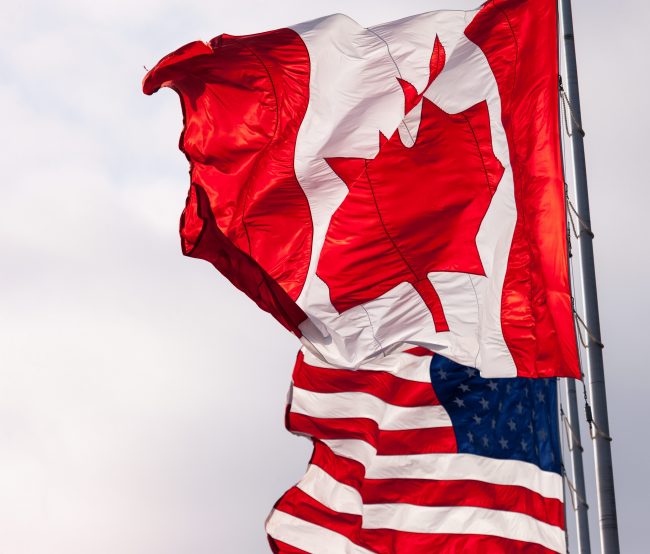Canadians aren’t so different from Americans when it comes to people’s feelings about protectionism.

Nearly 40 per cent of Canadians think that Canada needs to ‘take more steps to protect itself from today’s world’, compared to the global average of 31 per cent, according to a new Ipsos global poll provided to Global News.
A quarter of respondents preferred that Canada take steps to open itself up to the rest of the world, a further 25 per cent see merits in both viewpoints and 11 per cent were unsure.
The United States (47 per cent) is the only country that feels more strongly about the need to protect itself from outside influences, while the country most inclined to support opening up to the rest of the world is Peru (62 per cent).
Canadians are likely being influenced by events south of the border as well as across the pond in Europe, Sean Simpson, VP of public affairs for Ipsos, told Global News.
READ MORE: Trudeau’s greatest challenge in 2017? Engaging with US while protecting Canada, Baird says
“Canadians are looking at the things that are happening in Europe, stemming back to Greece’s debt concerns, Brexit, the refugee crisis, terrorism, a sluggish economy, high unemployment in many of those countries, and they may be reacting saying, well maybe we’re able to protect ourselves and what we have here, which isn’t fantastic but it’s not bad relatively speaking,” Simpson said.
WATCH: CETA: Freeland ‘delighted’ deal counters US ‘protectionist backlash’

“At the same time, they’re looking south of the border and they’re listening to the message of Donald Trump which is, we’re losing jobs to Mexico, we’re going to renegotiate NAFTA… and even though Mexico is the number one target, there will be some collateral damage impact in Canada.”
The poll found that business owners (35 per cent) were more likely to favour opening up Canada’s economy to foreign businesses and trade, compared to people who don’t own businesses (25 per cent).
“I think most people who are educated in economics, most business-people would tend to believe that freer trade is better and that trade creates wealth… if you own a business, yes you may be competing with international companies but ultimately you’d like to sell to international markets as well,” Simpson said.
WATCH: Canada-US trade relations under Trump presidency

On the issue of leadership, 65 per cent of Canadians said the country “needs a strong leader to take the country back from the rich and powerful,” which is close to the global average of 63 per cent.
However, Canadians fell well short of the global average when it came to the idea of embracing a leader who is perceived to be a rule breaker (41 per cent, compared to the global average of 49 per cent) or someone who’s able to say what’s on his or her mind regardless of what others think (57 per cent, compared to the global average of 64 per cent).
“I think there’s a recognition that yes, we have work to do here in Canada… but we haven’t yet reached a tipping point where we’re willing to throw a grenade into the political system to completely change our paradigm and the way we do politics in this country,” Simpson said.
READ MORE: Kevin O’Leary accused of delaying Tory leadership bid until after French debate
Respondents in France, at 80 per cent, were the most likely to favour a rule-breaking candidate.
“If you look at a country like France that’s had revolutions, they’re known for being more progressive and active in bringing change to the political system, so it’s not surprising that France appears to be one of the next countries willing to embrace a leader who breaks the rules,” Simpson says.
“Canadians by their very nature are a little more deferential.”
READ MORE: Canada’s weak dollar, First Nations history among issues that most embarrass Canadians: poll
Overall, Canadians remain more optimistic than citizens of other countries when it comes to assessing their country’s path.
Nearly four in ten Canadians say the country is in decline, which may seem like a high figure until it’s compared to the global average of 57 per cent among the 22 countries included in the survey.
Canada was the second-most optimistic country behind only India (22 per cent), while South Africans (77 per cent) were likeliest to state that their country is in decline.
READ MORE: Trudeau government begins to (slightly) lose its appeal: poll
Sixty per cent of Americans felt that way about the United States, while France polled at 67 per cent.
“When Donald Trump says ‘let’s make America great again’, 60 per cent of them believe in the decline and a message like that resonates,” Simpson says.
READ MORE: 1 in 5 Canadians feel less safe in public places than they did a year ago: poll
But among those Canadians who feel the country is in decline, 60 per cent still maintain the belief that Canada can recover from its perceived state of decline.
Simpson says this may be because some of the underlying factors, such as the economy, refugee crisis and election of Donald Trump, may be perceived as temporary in nature.
He points out that Japan is the only country where a very low percentage of respondents (24 per cent) have faith in their country’s ability to recover from a decline.
“That’s informed by decades-long recession. Japan hasn’t recovered from the tech bust and they’re still trying to get their economy to turn around and grow at a good clip.” Simpson says.
READ MORE: Goodbye 2016! Majority of Canadians think life will be better in 2017
The poll also found that 58 per cent of Canadians think experts don’t understand the lives of the common citizen, with the global average pegged at 60 per cent.
Canadians with a low level of education (65 per cent) were significantly more likely to hold this view than those with a high level of education (38 per cent), something Simpson attributes to the growing perception of a class divide.
“I think that’s part of Donald Trump was able to capitalize on in the United States… Hillary Clinton had a hard time connecting with voters and making people believe that she understood them,” Simpson said.
“Make no mistake, both are elites and wealthy yet somehow, Trump was able to convey that he understood what the average person was feeling.”
READ MORE: ‘Canada’s Donald Trump’: Kellie Leitch blasts ‘elites’ and ‘insiders’ during Fox interview
And that’s a big global trend, Simpson said: countries where citizens feel their leaders are out of touch are ones where there’s a desire for a “completely new person” who won’t play by the rules.
“So we would be fools to believe that some of the underlying feelings that Trump was capitalizing on don’t exist here in Canada,” Simpson added.
“Maybe not to the extent to which they exist in in the United States and France… but there is a significant chunk of the population that believes the elites are out of touch, that power is centered in the hands of a few and that maybe we need to re-examine how we approach trade and whose interests we’re putting first.”
Exclusive Global News Ipsos polls are protected by copyright. The information and/or data may only be rebroadcast or republished with full and proper credit and attribution to “Global News Ipsos.” This poll was conducted between Oct. 21 and Nov. 4, 2016 with a sample of 16,096 interviews with adults aged 16 to 64. The precision of Ipsos online polls is measured using a credibility interval. This poll is accurate to within +/ – 3.5 percentage points, 19 times out of 20, had all American adults been polled.




Comments